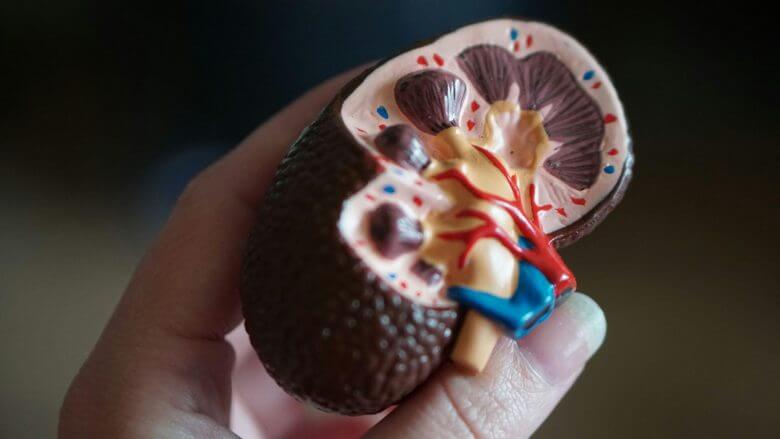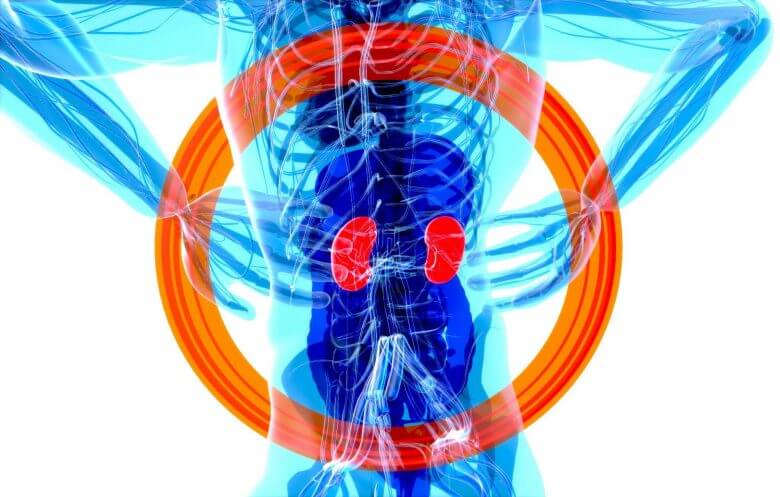Highlights
- Kidney stones are hard mineral deposits that form inside the kidneys. They can be extremely painful as they pass through the urinary system.
- Symptoms of kidney stones include pain, urinary urgency, nausea, and bloody or cloudy urine.
- Treatment for kidney stones can include medications for pain management and, in some cases, surgical intervention.
- Reduce the risk of kidney stones by staying active, well-hydrated, and making healthy lifestyle choices.
If you have large kidney stones, you’ll know it. Symptoms like waves of intense pain, the presence of blood in your urine, and a sense of urinary urgency are recognizable — but only a doctor can diagnose kidney stones and provide appropriate treatment.
Developing these sharp, crystal-like mineral deposits can happen to anyone, and treatment ranges from pain management to surgical intervention. The key to avoiding kidney stones is prevention.
What Are Kidney Stones?
Kidney stones (medically known as renal calculi) are hard mineral deposits that form inside the kidneys. Crystals of minerals like calcium collect with other waste in the urine until they become a “stone.” Each stone starts small, but over time, untreated kidney stones can grow large enough to block the flow of urine, leading to serious complications.
Kidney stones can vary greatly in both size and shape. They can be as small as a grain of sand or the size of a golf ball. They can have a smooth surface or be made up of sharp, jagged edges.
Types of Kidney Stones
There are several types of kidney stones, including:
- Calcium stones. This mineral-based kidney stone is the most common type, and is generally caused by dehydration or imbalanced calcium levels.
- Uric stones. These stones form when urine becomes too acidic, often due to chemicals found in animal proteins like meat and fish. This type of kidney stone may have genetic factors.
- Struvite stones. Bacterial urinary tract infections (UTIs) can result in struvite stones. This type can grow very quickly and develops an irregular branching shape.
- Cystine stones. This kind of kidney stone is caused by a rare genetic condition called cystinuria. Cystine stones make up less than 1% of kidney stones and are more common in children than adults.

Kidney Stone Symptoms
Kidney stones are infamous for causing severe pain as they move from the kidneys through the urinary tract. This is especially true if the stone is large or blocks the flow of urine.
Common symptoms include:
- Intense pain in the lower back, side, abdomen, or groin
- Increased urinary urgency or frequency
- Pain or burning during urination
- Bloody, cloudy, or foul-smelling urine
- Nausea, potentially accompanied by fever or chills
Kidney Stone Causes
Urine naturally includes waste, like calcium, oxalate, and uric acid. But when the concentration of these substances is too high for the fluid in your urine to dilute, a kidney stone may form.
Factors that contribute to this imbalance include:
- Dehydration, leading to more concentrated urine
- Too much protein, salt, or sugar in the diet
- Obesity or certain metabolic conditions
- Medical conditions including hyperparathyroidism, urinary tract infection, or chronic kidney disease
- Taking diuretics or calcium-based antacids
Kidney Stone Risk Factors
Anyone can develop kidney stones at any age, but they may be slightly more common among men than women. About 11% of men and 9% of women will develop kidney stones in their lifetime, and about half of all people who have had one kidney stone will have another. People with cystinuria have an especially high risk — as many as 80% will develop kidney stones before the age of 20.
Kidney Stone Diagnosis
Although the symptoms of kidney stones can be hard to miss, only a medical professional can confirm a diagnosis of kidney stones. Some symptoms, like changes in urine and sharp belly pain, can be confused for other conditions that may need treatment.
Reaching a diagnosis includes a review of the patient’s medical history, a physical examination, and diagnostic testing that may include:
- Blood tests to check for excess calcium or uric acid
- Urine testing to find crystals, bacteria, or other abnormal wastes
- Imaging tests including ultrasound, CT scans, or x-rays to locate the stones and determine their size

Kidney Stone Complications
For most people, kidney stones pass without causing lasting damage. However, recurrent or untreated kidney stones can lead to complications like:
- Recurrent urinary tract infections, which can damage the kidneys over time
- Obstruction of the urinary tract, leading to kidney damage
- Chronic kidney disease if stones form frequently or are left untreated
Kidney Stone Treatment
Treatment depends on the size, type, and location of your kidney stones. If you have a small stone, pain medications and increased fluid intake can help you pass them naturally.
Common medications include:
- Over-the-counter pain relievers like ibuprofen or acetaminophen
- Medications that ease the stone passage, like alpha blockers
- Thiazide diuretics like hydrochlorothiazide to reduce the amount of calcium in the urine
- Antibiotics if the stone is related to an infection
If your stone is larger or blocking your urinary tract, you may need more invasive treatment, such as:
- Shock-wave lithotripsy
- Ureteroscopy
- Surgery to remove or break down stones
Kidney Stone Prevention
Like many health conditions, the best way to prevent kidney stones is to make healthy lifestyle choices every day. Here are some steps you can take to prevent kidney stones:
- Drink plenty of fluids every day, especially water
- Limit sodium, sugar, and animal proteins in your diet
- Maintain a healthy body weight and stay physically active
- Take your medications as prescribed
- Speak to your doctor if you notice any symptoms of kidney stones

Get the Lowest Price for Kidney Stone Medications
Understanding what kidney stones are and how to treat them is the first step in protecting your urinary health. With the right knowledge and care strategies, it’s possible to minimize their impact and lead a healthier, more comfortable life.
Managing kidney stones can include managing medication costs, too. If your healthcare provider has prescribed medication to help treat kidney stones, you can find the best price with BidRx. Visit our medication page to get started.
This information is intended for general informational purposes only. It is not a substitute for professional medical advice, diagnosis, or treatment. Always seek the advice of your physician or other qualified health provider with any questions you may have regarding a medical condition or medication.
